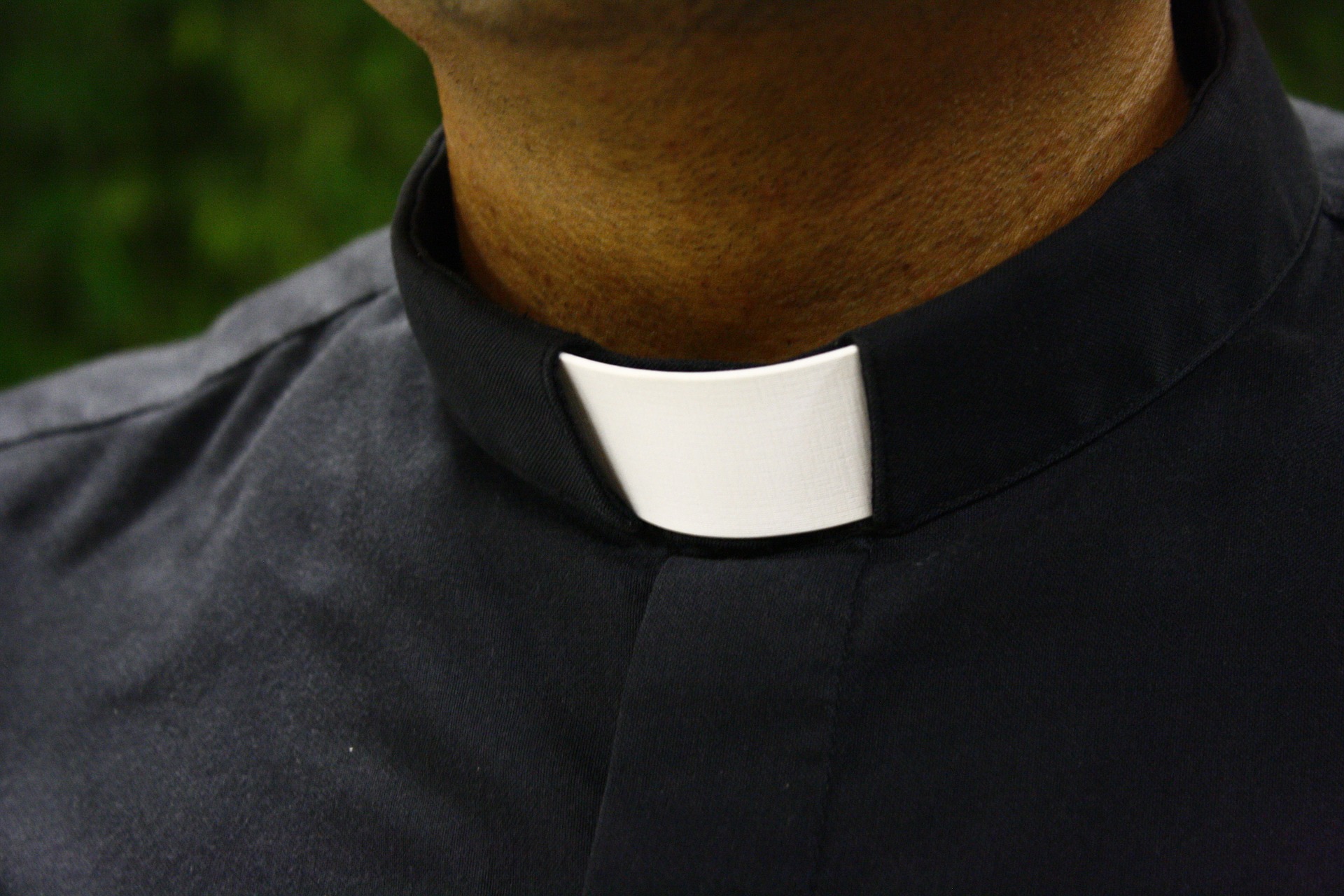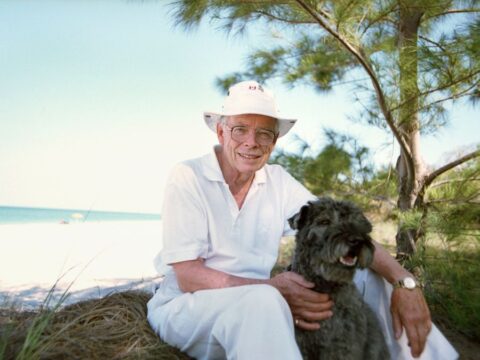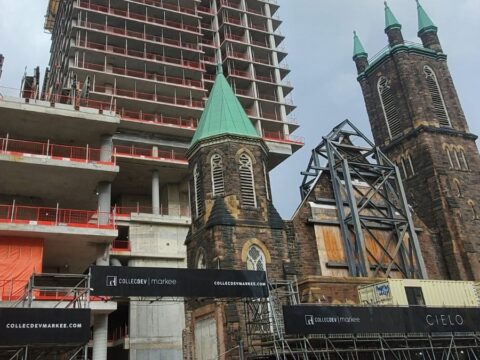I used to be certain of my position on honorifics and what I thought were other antiquated “clerical trappings” like collars and vestments: I wanted nothing to do with them, except when flashing the title could get me free parking at the hospital and wearing an alb could hide an unfortunate pre-service coffee spill.
Now, I’m admittedly on the fence.
You may unsubscribe from any of our newsletters at any time.
“Reverend” makes me cringe, and not just because it’s bad grammar (“Reverend” isn’t a noun and should properly be preceded by the article “the,” as in “the Reverend”). To me it feels arrogant, distancing and, frankly, not biblical. Would Paul have thought that one limb of the body, to use his church analogy, was more worthy of reverence than another?
Ministers who are put on linguistic pedestals have a longer way to fall, I remind my husband (also a minister) as we debate the issue. He looks at me quizzically. “I always thought the title meant that you were trying to aspire to be reverend, that in your profession, you strove to be reverend like a judge would strive to be honourable,” he says. Other colleagues echo the point.
So I go digging into the history of the word. I discover that the term “Reverend” comes from the Latin reverendus, originally used by the Roman Catholic Church, possibly as far back as the 15th century. Stemming from the verb reveri (to respect), it originally referred to the moral character of the minister.
Traditionally in the United Church, only ordained ministers took the honorific “Reverend.” In 2001, the general secretary extended the privilege to diaconal ministers, concluding that while they don’t commonly use the title, there is nothing in United Church polity to prevent them from doing so.
Today, whether ministry personnel actually use the honorific is an individual choice, and practices vary widely. The church seems more unified when it comes to addressing the moderator. According to the United Church website, an ordained moderator is designated “the Right Reverend.” Former moderators, if ordained, take the title “the Very Reverend.” A moderator who is a diaconal minister may choose whether or not to take “the Right Reverend” and “Very Reverend” designations. And lay moderators should be addressed according to their personal wishes.
Mardi Tindal, the church’s second female lay moderator, chose not to assume an honorific. I wonder what choices she had? When the commonly known honorifics are already claimed, what’s a lay moderator to do — borrow one from some other tradition or make one up? “The Very, Very Great” has a certain ring to it.
But seriously, when laity and ordinands are serving in the same spiritual leadership role, is it faithful to dangle a linguistic medal over those who are ordained or commissioned and leave laity to fend for themselves? Haven’t they been entrusted with responsibility and “set apart” in some way to minister? Do they not deserve an honorific too?
Many cherished colleagues would not take kindly to my line of questions. “Rev.” is conferred after a lot of time and money has been invested in education, after many denominational requirements have been met. There is much at stake in the conversation. Clergy honorifics aren’t just words; they have to do with educational investment, roles, ecclesiology and identity.
Rev. Bob Fillier (who would also have a “Dr.” in his title if The Observer style guide allowed it) serves in team ministry at St. Thomas United in Calgary. To my knowledge, Fillier is the only United Church minister of my generation who embraces honorifics as enthusiastically as he does the burgundy academic preaching gown he wears most Sundays. “My wearing a collar or using the honorific is a reminder to the community that they have conferred me as ‘the Reverend,’ and a reminder to me of the responsibility I’ve been entrusted with,” says Fillier.
He is open to the idea of an honorific for lay leaders, but “it would matter to me that the honorific be different,” he says. “In our institutional desire to uplift the laity, it often seems like we’ve figured out how to do that by lowering the clergy. In our desire to become less hierarchical, traditional, conservative — whatever — we’ve made everyone alike, and that’s just confusing.”
While the United Church permits ordered ministers to use “Reverend,” it seems less clear about who can’t use it. Some lay ministers adopt the honorific. Some ordained ministers wish they wouldn’t.
Rev. Steven Davis recalls a heated debate on the issue when he chaired a North Bay Presbytery committee several years ago. Members raised concerns after a lay pastoral minister began calling herself “Rev.” She was eventually “made aware that the Presbytery was unhappy about it, but really there was nothing we could do,” says Davis. “We were told that as a Presbytery, we could recommend, advise and state our preference for her not to use it — which we did — but there was nothing we could do about it if she didn’t take our advice.”
“There is no policy saying who can’t use the honorific. And no policy saying who can,” says Rev. Allan Hall, the General Council’s executive officer of ministry and employment. “Commonly, both our United Church communities and the wider ecumenical communities associate the title ‘Rev.’ with ordered ministry personnel. Therefore their use by DLMs [designated lay ministers] could be considered less than open and transparent.”
Perhaps it’s no surprise that honorifics cause tensions within church circles. But what do outsiders make of the label? Fillier thinks the “Rev.” tag can serve as a kind of “soft evangelism” in a culture that is suspicious of the church. “I don’t know how many conversations haven’t happened because of the collar or the honorific, but I do know how many conversations have taken place because of it,” he says. “I can’t count the number of times someone has seen a name tag and said, ‘You’re a Rev.? But you are so down to earth!’ There is baggage with the honorific, yet I think it’s worth trying to reclaim.”
I’ll buy that. It’s good that the general public knows we’re alive and kicking and not as stuffy as we’re made out to be.
That’s not why my stance on honorifics has softened, though. It has changed over the years as I’ve heard congregants express a need for me to be “the Reverend” for them. Not all of them, for sure. But many. Fight it as I may, many of my congregants are served by clerical symbols. Recently, one asked me if I’d wear a clerical collar to preside at a family member’s funeral. Having thrown mine out many years ago and with no time to spare, I cut one out of the back of a Q-tip box and prayed the jagged edge wouldn’t show. Standing there in makeshift clerical garb, I heard more “Reverends” and fielded more comments about how young I was to be a minister than anytime previously — with one notable exception, a memorial service I co-conducted in the Eastern Townships of Quebec well over a decade ago.
I distinctly remember wondering, “What will they say when they get to me?” Congregants were filing out of the memorial service, and I stood toward the end of the receiving line, preceded by a handful of Catholic and Anglican male colleagues who could have been twice my age. I was wearing an alb that admittedly looked like a cheap liturgical knock-off next to the hand-embroidered vestments they were wearing. “Thank you, Father,” the first stream of congregants whispered as they filed out. There was an awkward pause when they got to me. A number carried on with “Thank you, Father.” One said, “Thank you, Mother.” A couple looked me up and down and asked if I was a real priest. Several cut the honorifics altogether, settling on a simple “Thank you.”
In that moment, if I could have climbed into a bright, shiny cassock or pinned a name tag with “REVEREND” spelled in capital letters to my lapel, I might have. I would have liked the congregants coming down the line to know that yes, I am young, female and every bit the minister my colleagues are.
Being a visible minority in that instance had something to do with my deep impulse to cleave to the outward symbols. From the margins, honorifics can look different.
Rev. Thérèse Samuel, minister at Hawthorne United in Ottawa, has been actively involved in the Journeys of Black Peoples, a network of self-identified black people affiliated with the United Church. “For those of us who have been on the oppressed side of colonization, trying to achieve a place of respect is an ongoing struggle. It becomes part of my decision-making around honorifics,” she says. Samuel uses the honorific on business cards, in phone messages, in e-mail signatures and occasionally in her congregation. She says she would like to use the title more but sometimes shies away because of the perception of colleagues. “I feel the pressure at times not to use it, like I’m not supposed to.”
Samuel’s experience makes me question my own ambivalence about honorifics. Do my personal choices deter colleagues from embracing the title, especially those who have more at stake in it than I do? In some languages, honorifics are to sentences what oxygen is to breath. As the United Church strives to become more intercultural, is how we address ourselves and one another worth a closer look?
All told, the arguments for and against honorifics stack up pretty evenly for me. I sincerely hope that down the road, a colleague or congregation member will present me with a compelling reason to stop waffling.
Lately, I’ve taken to the term “pastor.” I like the country twang, but I hazard a guess that some congregants would prefer to think of me as being reverent than to think of themselves as bleating sheep.
So I’ll keep signing official correspondence with “the Reverend,” pull it out on occasions when my functional role is important, respond politely when congregants insist on vesting me with the honour and hope it buys me a parking pass or two. That said, I am extremely thankful that the United Church doesn’t embrace too many honorifics. “Your Eminence” would send me over the edge.
This story first appeared in The Observer’s November 2012 issue with the title “To rev. or not to rev.”














